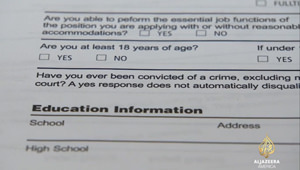Should Employers Be Allowed to Discriminate Based on Criminal Records?
If we want individuals to form part of society after they've been released from prison, the question on job applications about convictions should be prohibited, some people believe. In certain places, the process of "banning the box" has already begun.
It’s no surprise that many employers, when reading over job applications, tend to place those with a check next to the ominous question “Have you ever been convicted of a crime?” at the bottom of the stack. Although the phrase may seem inevitable due to its presence on most if not all work applications, some cities and states have decided it’s unnecessary.
The idea behind the push to “ban the box” is that if we truly want individuals to form part of society after they’ve been released from prison, the conviction question on job applications should be eliminated. Seattle, for example, has recently passed a law that obliges employers to schedule an interview before knowing whether the applicant has a record. This would allow the prospective employee the opportunity to explain the conviction, and give people a new chance to discuss their skills without being branded with a scarlet letter from the get-go. The new law, however, does not apply to those who have been found guilty of a crime that directly conflicts with the job in question.
There are 50 cities and 10 states trying to give people a fresh start after serving time by passing laws such as this. One part of the measures that still haven’t been worked out completely is that once employers become aware of applicants’ criminal records, they can still deny them the position. Some people note that there are other programs and laws that are also needed to help rehabilitate former felons, such as workshops to help them through the job application and interview process.
However, as Marquez Taylor, a 20-year-old formerly imprisoned for committing robbery, says in this Al-Jazeera America clip, “Ban the box is not a solution,” it is “a first step in helping felons give back to society.” And, as Taylor points it, it will help alleviate the desperation caused by the constant rejection many face after being in jail, which often pushes them back toward a life of crime.
—Posted by Natasha Hakimi
Your support matters…Independent journalism is under threat and overshadowed by heavily funded mainstream media.
You can help level the playing field. Become a member.
Your tax-deductible contribution keeps us digging beneath the headlines to give you thought-provoking, investigative reporting and analysis that unearths what's really happening- without compromise.
Give today to support our courageous, independent journalists.





You need to be a supporter to comment.
There are currently no responses to this article.
Be the first to respond.